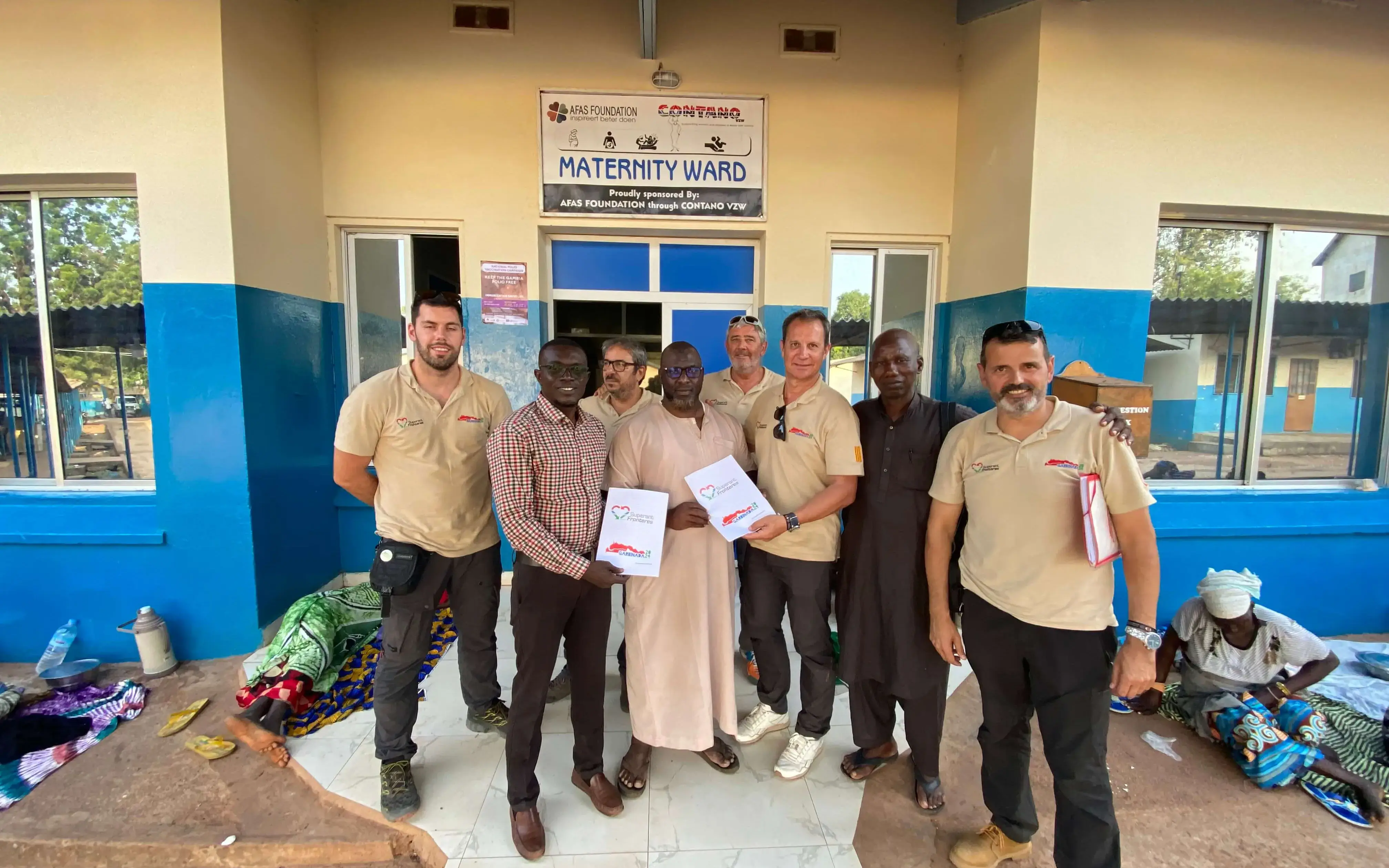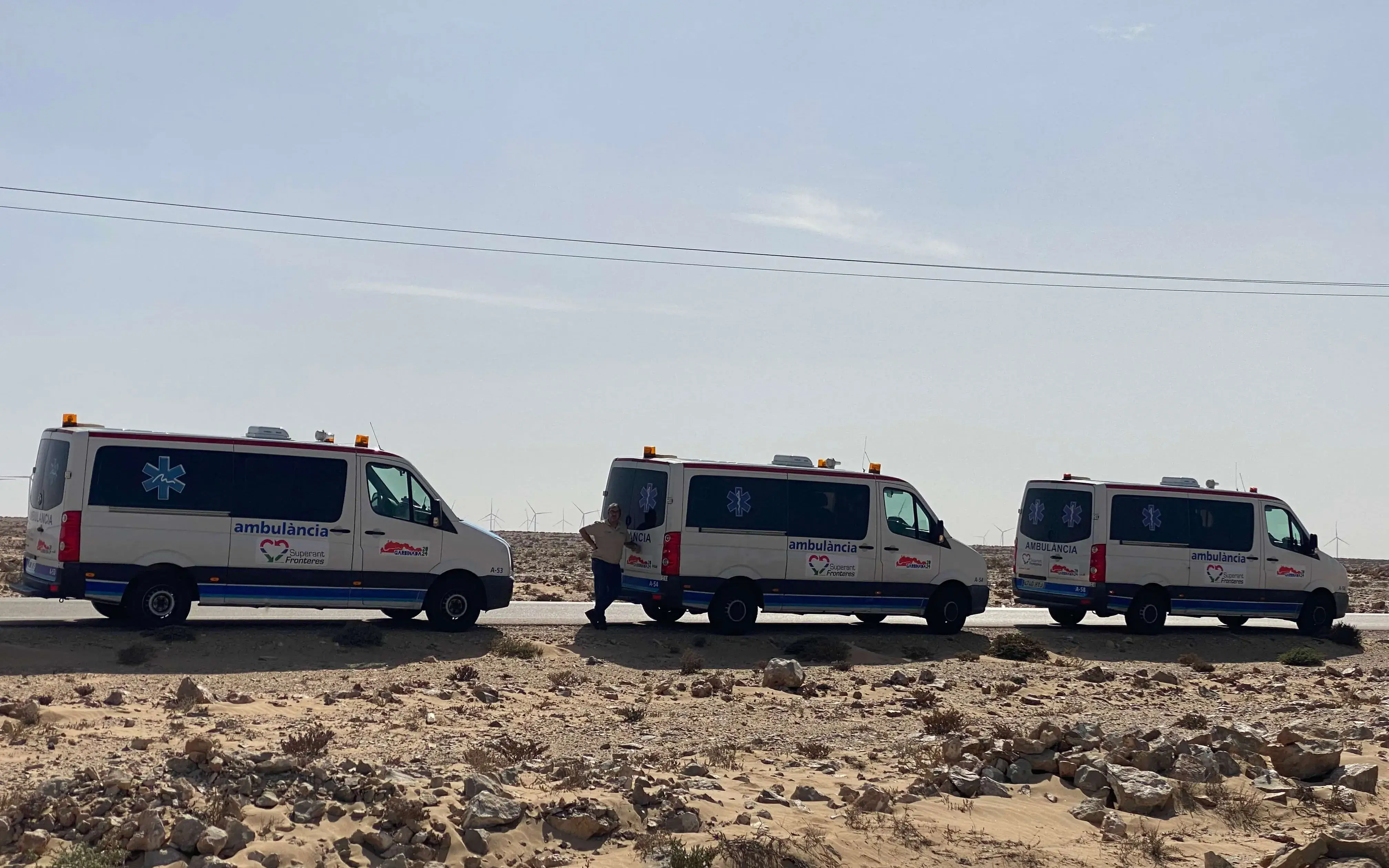David Mora: "The values that guide our philosophy of cooperation are transparency and proximity"
We delve into the work of Superant Fronteres, an association from Lleida founded in 2022 that focuses its efforts on Gambia.
A common reflection among those who travel to Africa is that the continent always puts things into perspective. This was the immediate feeling experienced by the members of Superant Fronteres, a Lleida-based association created in 2022 that has since dedicated its efforts to Gambia, particularly in the healthcare sector.
In just over two years, Superant Fronteres has delivered all kinds of medical equipment and ambulances to Gambia, where they have built networks and established connections that have enabled them to become increasingly involved with the country and its people. To learn more about the project, we speak with David Mora, one of the association’s founders.
Did Superant Fronteres emerge by accident?
Practically, yes. We embarked on this adventure in 2022 by joining a project led by the British section of the International Police Association (IPA), as some of us are members of the Mossos d’Esquadra (Catalan police). We learned that the British were organizing an expedition to Gambia to deliver emergency vehicles, and we wanted to join.
You organized everything in a very short time.
In just two or three months, we purchased an ambulance, prepared it for the journey, filled it with medical supplies, and joined the British convoy—almost like an adventure. That’s how we reached Gambia, though not without challenges, as the journey was quite complex.
So, the journey was your first challenge.
For us, it was a significant shock. Not just arriving in Gambia, but the entire journey and the difficulties we encountered along the way—crossing Western Sahara, Mauritania, Senegal… The trip had its share of challenges.
Despite everything, you decided to continue with the association.
Yes, because we loved the experience. From there, we strengthened the contacts we had made before leaving and the ones we established in Gambia, where we visited hospitals, spoke with various groups, and identified the different needs. Learning about the realities of Gambia and Africa motivated us and inspired us to move forward with the project.
What was your first impression upon setting foot in Africa?
A major shock—coming from Catalonia and seeing these realities makes you realize and understand many things, such as the phenomenon of migration and the perilous journeys on small boats. Suddenly, many things make sense. This motivated us to continue with Superant Fronteres. We then expanded our circle, gathered more friends and volunteers to organize activities, raise funds for the project, and even travel to Gambia. Gradually, we became more involved in the project, the country, and its people. In our last trip in November, nine of us went.
An expedition you named Operation Garbinada 2024.
Thanks to the collaboration of hospitals in Lleida, companies, and various private donors, we managed to fill a 40-foot shipping container with medical equipment. Additionally, we purchased three ambulances that we drove down. All of this was distributed to five hospitals across Gambia, which we had previously contacted and identified their needs.
In which parts of Gambia have you been present?
We’ve had the opportunity to explore different areas. Through collaboration with another organization, Alpicat Solidari, we worked in Baja Kunda, in the country’s interior, where we provided equipment and an ambulance to the local hospital. We’ve also worked with two other hospitals: the Edward Francis Small Teaching Hospital in Banjul and the hospital in the Fajikunda neighborhood near the capital. Additionally, we’ve been to the Upper River region, north of the Gambia River. We’ve traveled quite a bit, really.
How would you describe Superant Fronteres’ approach to cooperation?
We are still newcomers in this field and have much to learn. However, if you try to apply for public funding, you quickly realize that the focus is shifting away from direct aid, as that is not the current model of cooperation. That said, there are certain realities we cannot ignore.
In what sense?
Let me explain: We can agree on the importance of educational projects for social transformation, but if a medical dispensary or village lacks an ambulance to transport a woman in labor to a hospital, that woman could die in the process.
That’s a strong argument.
We often have debates with university specialists or municipal cooperation officers, who sometimes tell us that what we do is mere assistance. Fair enough, but whenever we speak with African community associations here, for example, they always ask us for an ambulance for their hometown—mainly because they know us for that specific effort, which is perhaps the most visible aspect of what we do. This contrasts somewhat with the prevailing view of cooperation.
You also mentioned the example of the trend in well construction.
Exactly, for a while, building wells was a major focus. It was said that instead of building wells, we should educate communities to manage their resources properly, and so on. That’s great, but the reality is that if a well isn’t built, there won’t be water. So first, let’s build the well, and then we can work on achieving social transformation.
What values guide Superant Fronteres' work?
Our core values are transparency and proximity. We want our collaborators—whether governments, businesses, or individuals—to be close to us and understand that every euro we raise goes entirely to our projects. Our association is entirely volunteer-based, we have no staff or overhead costs, and we cover our own travel expenses. Another crucial aspect for us is the follow-up and evaluation of everything we do.
In a few days, you are returning to Gambia.
Yes, because part of the project remains unfinished—we need to train medical staff on how to use the equipment we delivered. We brought six ultrasound machines, and in hospitals like Baja Kunda, where there are no doctors, the staff doesn’t know how to use them. We’re going there to train them because we don’t want this to be just a one-time effort. We had to postpone this training when one of the doctors scheduled to travel fell ill. We’re leaving on March 24 with a specialist doctor and a gynecologist.
The trip will also serve to take the first steps toward a new project.
Yes, we will begin working on a project initiated by a Gambian NGO with whom we have established strong ties. The idea is to build a hospital in an area that currently has no healthcare facilities. It’s a medium-to-long-term project, spanning three to four years, and we are very excited about it.
Do you plan to expand beyond the healthcare sector?
If the hospital project moves forward, which it surely will, we also want to establish a permanent base for the association. A multifunctional space that can host volunteers working at the hospital and address educational issues related to social transformation. For example, Gambia has high rates of female genital mutilation, and this is one of the issues we aim to address.
Having a dedicated space could open many opportunities.
That’s the idea. With this infrastructure, we can conduct training on various issues and provide a space for other NGOs that focus more on social transformation rather than direct cooperation.
What challenges have you faced in your work?
The biggest challenges have been our lack of knowledge and experience. Entering this field is a reality check. You might think your project is great, but then an administration tells you that it lacks certain elements. Still, we’ve managed to mobilize a lot of people through our events—both individuals and businesses. We’ve organized fundraising breakfasts and lunches, and the support has been incredibly positive.
What has Superant Fronteres given you?
A lot of work, but also immense satisfaction. It gives you a new perspective and a deeper sense of purpose. You empathize more with people forced to migrate due to dire circumstances. You realize how privileged we are, despite our daily struggles. We take something as simple as turning on a tap for granted, but most of the world doesn’t have that luxury.








Add new comment